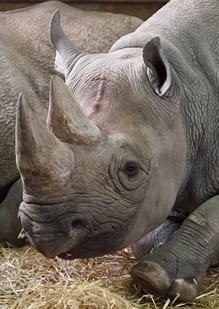Biodiversity management agreements and corresponding tax incentives concluded with landowners for the implementation of the biodiversity management plans for the southern black rhinoceros and African lion in Limpopo
12 November 2023
The Department of Forestry, Fisheries and the Environment, together with the Sustainable Finance Coalition and in consultation with the Wilderness Foundations Africa (WFA), has developed biodiversity management agreements (BMAs) to be implemented by three private rhino and lion owners in Limpopo.
The BMAs, which are valid for a period of five years are linked to the implementation of the biodiversity management plans (BMPs) for the iconic species. These are the first BMAs to be developed and implemented in South Africa. These agreements offer unique biodiversity tax incentives for the landowners in terms of the Income Tax Act (ITA, Act 58 of 1962). The purpose of a biodiversity management agreement (BMA) is to allow for a person, organisation, or organ of state to manage a species or ecosystem through an approved biodiversity management plan (BMP), or to implement a part of that BMP, in accordance with National Environmental Management Biodiversity Agreement (NEMBA, Act No. 10 of 2004) and associated regulations.
The catalytic nature of the BMAs and their corresponding tax incentives are examples of South Africa's innovative and effective conservation as well as sustainable finance efforts.
In terms of the BMAs, the landowners undertake to carry out certain measures that contribute to the efforts of achieving the objectives for the conservation and management of wild lions and rhino and undertake to comply with all legal obligations relating to the management of lions and rhino as appropriate. The landowners who concluded the BMAs for the southern black rhino and the African lion, manage the species in open system protected areas in Limpopo.
Furthermore, the landowner is required to carry out numerous conservation-related measures and be responsible for any costs related to the management of the animals. These costs may be deducted through the associated tax incentive once all tax requirements are met. The application of this conservation tax deduction is achieved through the coalition's finance solution approach which supports the Global Biodiversity Framework goals and sustainable finance needs. The owners of the animals will also submit annual reports on progress with implementation of the BMAs to the minister.
It should be noted that the BMPs for both the black and white rhino and the African lion are presently being reviewed, which means the BMAs will be modified and updated once these are finalised to ensure alignment. The implementing agent for the Rhino BMPs is the Rhino Management Group and for the Lion BMP it is the National Lion Working Group.
For media queries contact:
Peter Mbelengwa
Cell: 082 611 8197
Editor's note:
In June 2020, the Wilderness Foundation Africa (WFA) approached the Department of Forestry, Fisheries and the Environment (DFFE) in relation to tax incentives in conservation under the Sustainable Finance Coalition (the coalition). The coalition brings together a knowledge base of thought leaders, experts and stakeholders from private and public sectors and, together, address the financial needs of sustainable conservation landscapes across the country. The coalition launched a BMA tax incentive investigation incubator with the department to investigate how to unlock the tax incentive designed for biodiversity management agreements as provided for in section 44 of the NEMBA and the link to biodiversity management plans.
A person who enters into a biodiversity management agreement (BMA) qualifies for a tax deduction in terms of the ITA. In terms of section 37(C)(1) and section 37(C)(2) of the ITA, the amount of money expended by a taxpayer on the implementation of a biodiversity management plan (BMP) is deductible from that taxpayer's taxable income derived from economic activities conducted on the land where the BMA is implemented. Despite several BMPs having been developed, inter alia for the species of rhino, cycads, and African lion no BMA has been signed, and the tax benefit provided for in the ITA has not been realised. In 2022, the WFA, supported by the coalition, launched a pilot project to test the tax benefit provided for in the ITA in the context of southern black rhinoceros and African lion conservation in South Africa given that there are existing BMPs for those species.


